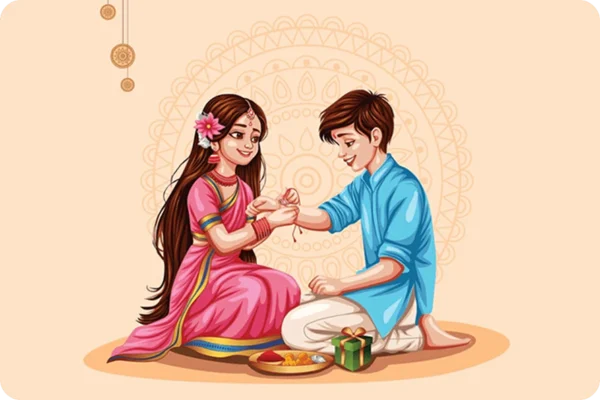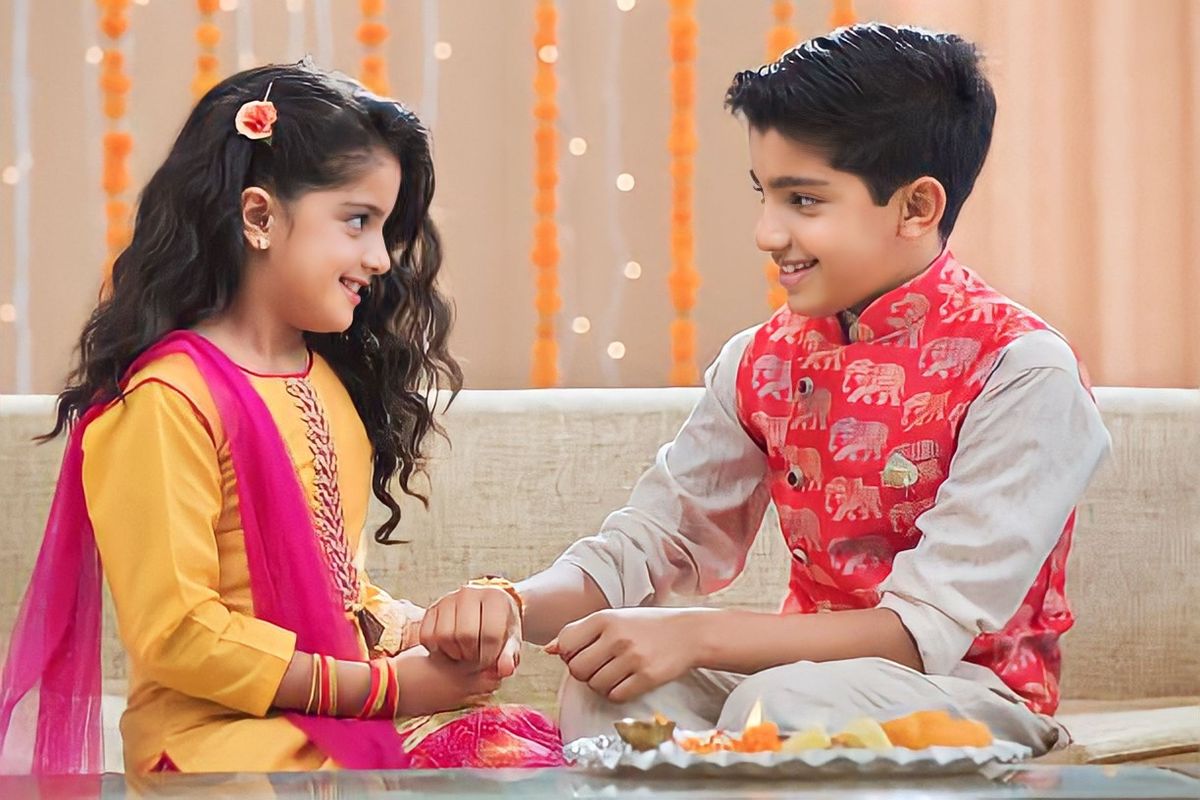Raksha Bandhan is a festival that celebrates the eternal bond of love and protection between brothers and sisters. Discover its history.

A Day That Feels Like Home
If you’ve ever celebrated Raksha Bandhan, you know it’s not just a date on the calendar.
It’s the sound of laughter echoing in the house.
It’s the smell of fresh sweets in the kitchen.
It’s the soft rustle of silk threads in your sister’s hands as she chooses the perfect Rakhi.
On this day, sisters tie a Rakhi — a small, colorful thread — on their brother’s wrist.
And in that simple act, they pour in years of love, care, and prayers.
Brothers respond with a smile, a promise, and often a tight hug that says, “I’ve got you, always.”
The Stories That Made Raksha Bandhan Eternal
Krishna and Draupadi – When a Saree Became a Shield
In the great Mahabharata, Lord Krishna cut his finger while using the Sudarshan Chakra.
Draupadi, without hesitation, tore her saree and wrapped it around his wound.
It wasn’t just cloth — it was love.
Krishna remembered her kindness forever.
Years later, when Draupadi faced humiliation in the Kaurava court, Krishna came to her rescue, protecting her dignity.
Rani Karnavati and Emperor Humayun – A Rakhi Beyond Borders
In the 16th century, Rani Karnavati of Chittor faced a deadly attack.
She knew her army could not win, so she sent a Rakhi to Mughal Emperor Humayun.
He didn’t see religion, politics, or power.
He saw a sister asking for help — and he came.
Even history bows to this moment of humanity.
Yamuna and Yama – The Gift of Forever
The river goddess Yamuna put a Rakhi on her brother. Yama was the god of death.
Yama, moved by her affection, granted her immortality.
He declared that anyone who tied a Rakhi would be blessed with long life and protection.
The Ritual That Touches the Heart
The Raksha Bandhan morning feels different.
Sisters prepare a thali with Rakhi, rice grains, vermilion, sweets, and a glowing diya.
They apply tilak on their brother’s forehead, tie the Rakhi, and offer something sweet.
Brothers give gifts — sometimes wrapped in shiny paper, sometimes hidden in a mischievous smile.
But the real gift is not in the box.
It’s in the bond.
It’s in that unspoken promise: “No matter what happens, you’ll never stand alone.”
One Festival, Many Colors
India’s diversity makes Raksha Bandhan even more special.
- In West Bengal and Odisha, it connects to Lord Jagannath and his sister Subhadra. To know more about this divine sibling love, read about the Jagannath Rath Yatra.
- In Maharashtra, fishermen celebrate Nariyal Purnima, offering coconuts to the sea for protection.
- In Rajasthan, women tie Rakhi to their brother-in-law’s wife too, turning family into friendship.
- In Nepal, it’s Janai Purnima, when men also change their sacred thread.
The Deeper Meaning
Raksha Bandhan teaches us that protection is more than fighting dangers.
It’s standing up for someone when they need you.
It’s holding their hand in silence when words are not enough.
It’s faith — like the devotion seen during Ram Navami.
Rakhi in Today’s World
Distances no longer stop Raksha Bandhan.
Rakhis travel across cities, countries, and oceans.
Sisters send them to brothers serving in the army.
Some people tie Rakhis to trees, promising to protect nature.
The festival has grown beyond blood relations.
It’s about anyone you choose to stand by, for life.
You can read more about India’s traditions at www.america112.com.
A Thread That Holds a Lifetime
When a sister ties a Rakhi, it’s not just for that day.
It’s a reminder of shared childhood fights, stolen chocolates, and long talks under the stars.
It’s the comfort of knowing someone will always have your back.
Raksha Bandhan is a festival.
But more than that, it is a feeling. It is a thread that holds together the moments, the promises, and the love that time can never fade.

